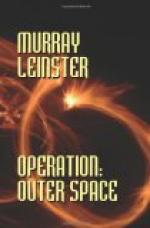One of the stars grew brighter. He didn’t know when he first picked it out, but he knew when he’d found it. He fixed his eyes on it. It was a very white star, and for a space of minutes it seemed in no wise different from its fellows. But it grew brighter. Presently it was very bright. It was brighter than Sirius. In seconds more it was brighter than Venus. It increased more and more rapidly in its brilliance. It became the brightest object in all the heavens except the crescent moon, and the cold intensity of its light was greater than any part of that. Then Cochrane could see that this star was not quite round. He could detect the quarter-mile-long flame of the rocket-blast.
It came down with a rush. He saw the vertical, stabbing pencil of light plunge earthward. It slowed remarkably as it plunged, with all the flying aircraft above the city harshly lighted by its glare. The space-port itself showed clearly. Cochrane saw the buildings, and the other moon-rockets waiting to take off in half an hour or less.
The white flame hit the ground and splashed. It spread out in a wide flat disk of intolerable brightness. The sleek hull of the ship which still rode the flame down glinted vividly as it settled into the inferno of its own making.
Then the light went out. The glare cut off abruptly. There was only a dim redness where the space-port tarmac had been made incandescent for a little while. That glow faded—and Cochrane became aware of the enormous stillness. He had not really noticed the rocket’s deafening roar until it ended.
The helicab flew onward almost silently, with only the throbbing pulses of its overhead vanes making any sound at all.
“I kidded myself about those rockets, too,” said Cochrane bitterly to himself. “I thought getting to the moon meant starting to the stars. New worlds to live on. I had a lot more fun before I found out the facts of life!”
But he knew that this cynicism and this bitterness came out of the hurt to the vanity that still insisted everything was a mistake. He’d received orders which disillusioned him about his importance to the firm and to the business to which he’d given years of his life. It hurt to find out that he was just another man, just another expendable. Most people fought against making the discovery, and some succeeded in avoiding it. But Cochrane saw his own self-deceptions with a savage clarity even as he tried to keep them. He did not admire himself at all.
The helicab began to slant down toward the space-port buildings. The sky was full of stars. The earth—of course—was covered with buildings. Except for the space-port there was no unoccupied ground for thirty miles in any direction. The cab was down to a thousand feet. To five hundred. Cochrane saw the just-arrived rocket with tender-vehicles running busily to and fro and hovering around it. He saw the rocket he should take, standing upright on the faintly lighted field.




